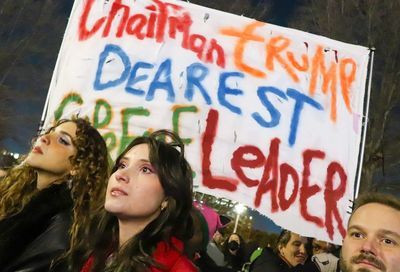Superficial Ball
'Six Feet Under' scribe Alan Ball's 'All That I Will Ever Be' is as deep as the hot tub that shows up during Act 1
All That I Will Ever Be starts with possibly the most insipid act to be found in one of the most stereotypically superficial cities in the country: buying a cell phone in Los Angeles. Unfortunately, from this point forward, Alan Ball’s play is about as deep as the hot tub that shows up later in Act 1.
Ball’s best-known works — Six Feet Under and American Beauty — were embraced for their amazing and brutal insights into the human psyche. In his latest play, it feels as if Ball has dusted off one of his earlier works, one that only scratches the surface of themes he’s proven he can fully dissect. It’s almost hard to believe that all the material comes from the same man.

‘All That I Will Ever Be’
All That I Will Ever Be is the tormented tale of two gay men and the baggage that each brings to the relationship. Naturally, the two are polar opposites: Dwight (Parker Dixon) is rich, unmotivated, usually stoned, and has a sexual fetish for Arab men; Omar (Carlos Candelario) is a cell-phone salesman and hustler, who advertises himself as fulfilling needs like Dwight’s. After a horribly awkward initial sex scene, during which Dwight screams choice phrases including, ”Fuck me, Osama,” and other racial slurs, the two seem to hit it off. Why, exactly, remains horribly unclear.
The rest of the play is about Dwight and Omar figuring out who Dwight and Omar really are. Both are needy, moody, manipulative, and not much fun to watch. Individually and together, they are placed in an increasingly bizarre and contrived series of situations designed to allow them to deliver diatribes of self-awareness that do nothing to change their (or Hollywood’s) reputation of being phony and plastic.
Neither Dixon nor Candelario are able to rise above the script. Dixon does fare better as the spoiled rich kid, occasionally showing a glimpse of the better side of Dwight. Playing an erratic and short-fused character allows Dixon to avoid subtly and hit the extremes of emotions. Candelario, however, is both uninspiring and uneven. He fails to inhabit his character, flubbing lines and lacking the ability to cover it with any semblance of improvisation. Omar is written as a complex character with mystery surrounding his identity. However, it’s challenging to invest in Omar when you can’t tell what’s supposed to be a crack in the character’s charade and what’s a forgotten line. Additionally, even though Omar claims to be bisexual, his flamboyant side emerges at odd moments, almost as if Candelario suddenly realizes he’s not light enough in his loafers and hams it up for a couple lines. Too much of the play rests on this character and the actor caves under the role.
In supporting roles, Leayne Freeman and Richard Mancini are great additions, even though both of their characters are contrived to the point of being laughable.
Director Serge Seiden is able to squeeze a little blood from this sinking stone. For the lack of quality materials he has to work with, Seiden keeps the show moving forward, plowing through the awkward scenes. He seems to understand the show’s limits.
To March 9
Studio Stage 4
1501 14th St. NW
$29
202-332-3300
www.studiotheatre.org
What is most rewarding about All That I Will Ever Be is its use of Studio’s Studio 4 space. Set designer Luciana Stecconi’s stage is one large square split into nine square tiles, and John Burkland’s lighting illuminates these tiles in a variety of geometric patterns to change the setting. Though most scenes feature little more than an added table or chair, the aforementioned hot-tub scene is the pièce de résistance of the show. Pulling back a tile, Omar and Dwight submerge themselves in a couple inches of water for one of their more ”revealing” conversations. In fact, their most intimate conversations take place during various stages of undress, which ultimately feels more gratuitous than anything else.
The final moments of All That I Will Ever Be reveal just how far off track Ball has taken his story. Omar’s hustling seems to have become some odd therapy session that he forces on his clients, which is both disturbing and ludicrous. It’s not Ball’s finest moment, and makes one think that maybe this script should be sent six feet under.
Support Metro Weekly’s Journalism
These are challenging times for news organizations. And yet it’s crucial we stay active and provide vital resources and information to both our local readers and the world. So won’t you please take a moment and consider supporting Metro Weekly with a membership? For as little as $5 a month, you can help ensure Metro Weekly magazine and MetroWeekly.com remain free, viable resources as we provide the best, most diverse, culturally-resonant LGBTQ coverage in both the D.C. region and around the world. Memberships come with exclusive perks and discounts, your own personal digital delivery of each week’s magazine (and an archive), access to our Member's Lounge when it launches this fall, and exclusive members-only items like Metro Weekly Membership Mugs and Tote Bags! Check out all our membership levels here and please join us today!






















